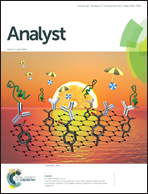Phage & phosphatase: a novel phage-based probe for rapid, multi-platform detection of bacteria†
Abstract
Genetic engineering of bacteriophages allows for the development of rapid, highly specific, and easily manufactured probes for the detection of bacterial pathogens. A challenge for novel probes is the ease of their adoption in real world laboratories. We have engineered the bacteriophage T7, which targets Escherichia coli, to carry the alkaline phosphatase gene, phoA. This inclusion results in phoA overexpression following phage infection of E. coli. Alkaline phosphatase is commonly used in a wide range of diagnostics, and thus a signal produced by our phage-based probe could be detected using common laboratory equipment. Our work demonstrates the successful: (i) modification of T7 phage to carry phoA; (ii) overexpression of alkaline phosphatase in E. coli; and (iii) detection of this T7-induced alkaline phosphatase activity using commercially available colorimetric and chemilumiscent methods. Furthermore, we demonstrate the application of our phage-based probe to rapidly detect low levels of bacteria and discern the antibiotic resistance of E. coli isolates. Using our bioengineered phage-based probe we were able to detect 103 CFU per mL of E. coli in 6 hours using a chemiluminescent substrate and 104 CFU per mL within 7.5 hours using a colorimetric substrate. We also show the application of this phage-based probe for antibiotic resistance testing. We were able to determine whether an E. coli isolate was resistant to ampicillin within 4.5 hours using chemiluminescent substrate and within 6 hours using a colorimetric substrate. This phage-based scheme could be readily adopted in labs without significant capital investments and can be translated to other phage–bacteria pairs for further detection.


 Please wait while we load your content...
Please wait while we load your content...